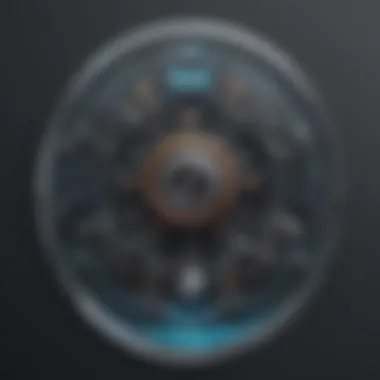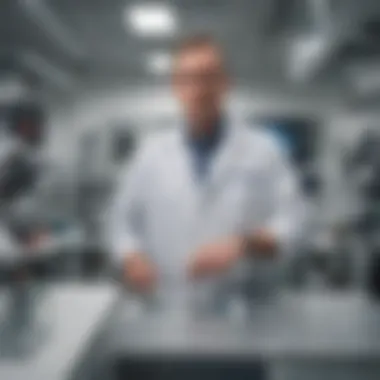Unlocking the Potential: Exploring Medical Device Jobs in Charleston, South Carolina


Tech Trend Analysis
In Charleston, SC, the medical device industry is experiencing a notable trend towards embracing cutting-edge technologies for enhanced patient care. With a focus on precision and innovation, companies are investing heavily in research and development to stay ahead of the competition. This trend not only impacts the quality of healthcare services but also presents exciting opportunities for tech enthusiasts and industry professionals to explore advancements in medical device technology. Consumers can expect improved treatment outcomes and more personalized healthcare experiences as a result.
Product Reviews
When delving into the medical device market in Charleston, SC, one can encounter a range of innovative products designed to revolutionize patient care. These devices boast advanced features and specifications aimed at improving diagnosis, treatment, and monitoring of various medical conditions. By conducting a comprehensive performance analysis, professionals in the industry can evaluate the effectiveness of these devices. While each product comes with its set of pros and cons, experts recommend selecting devices based on specific needs and intended applications to maximize benefits.
How-To Guides
For individuals venturing into the realm of medical device jobs in Charleston, SC, understanding the intricacies of this industry is paramount. This guide offers a step-by-step introduction to the essential concepts and practices involved in working with medical devices. Readers can gain valuable insights, tips, and tricks on navigating the complexities of this sector efficiently. Additionally, troubleshooting common issues that may arise when using medical devices is crucial for ensuring optimal performance and user satisfaction.
Industry Updates
The ever-evolving landscape of the medical device industry in Charleston, SC, is marked by constant updates and advancements. From breakthrough technologies to regulatory changes, staying informed about recent developments is crucial for industry professionals. Analyzing market trends and their impact on businesses and consumers provides valuable insights into the future direction of the sector. By staying abreast of industry updates, individuals can adapt their strategies and practices to remain competitive in this dynamic and rapidly changing environment.
Introduction
One of the exciting frontiers in the realm of job opportunities is the domain of medical device careers, particularly within the vibrant cityscape of Charleston, SC. This article embarks on an exploratory journey into the multifaceted world of medical device jobs in Charleston, offering a meticulous examination of the burgeoning industry's nuances and intricacies. By shedding light on the demand for specialized professionals and the anticipatory growth trajectories within this sector, readers will gain a profound insight into the dynamic equilibrium that defines Charleston's medical device job market.
Overview of Charleston, SC
Nestled in the heart of South Carolina, Charleston stands as a metropolitan jewel brimming with history, culture, and a rapidly evolving economic landscape. Known for its charming cobblestone streets, ancestral homes, and burgeoning tech scene, Charleston serves as a fertile ground for the blossoming medical device industry. Against the backdrop of its rich heritage and modernity interplay, Charleston offers a seamless synergy between tradition and innovation, elevating its status as a pivotal hub for medical device advancements in the Southeastern United States.
Medical Device Industry in Charleston
In this article, we delve into the thriving Medical Device Industry in Charleston, SC, shedding light on its significance and impact on the local economy. The sector plays a vital role in driving technological innovation and job creation in the region, making it a focal point for industry professionals and enthusiasts alike.
Emergence of Medical Device Sector
Historical Background:
The Historical Background of the Medical Device Sector in Charleston traces back to its early foundations, marked by a legacy of innovation and scientific advancements. This historical context provides valuable insights into the evolution of medical technology within the region, shaping its current industry landscape. Understanding these historical roots is essential for appreciating the sector's growth trajectory and future potential.


Key Milestones:
Key Milestones in the Medical Device Sector of Charleston represent pivotal moments that have shaped its development. These milestones encompass significant achievements, breakthroughs, and regulatory changes that have influenced the industry's direction. Analyzing these key milestones offers a glimpse into the sector's progress and the challenges overcome along the way.
Major Players in Charleston
Companies at the Forefront:
The Companies at the Forefront of Charleston's Medical Device Industry are renowned for their innovation, quality products, and contributions to healthcare advancements. These established enterprises set the standard for excellence and drive competition within the sector, fostering a culture of continuous improvement and technological innovation.
Innovative Startups:
Innovative Startups in Charleston bring fresh ideas, agile methodologies, and disruptive technologies to the medical device scene. These startups inject dynamism and creativity into the industry, challenging traditional norms and pushing boundaries to redefine the future of healthcare. Their entrepreneurial spirit and risk-taking mindset make them key players to watch in the evolving landscape.
Technological Advancements
Impact on Job Market:
Technological Advancements in the Medical Device Industry have significantly influenced the job market dynamics in Charleston. The integration of cutting-edge technologies, such as artificial intelligence and robotics, has created new opportunities and skill requirements for professionals in the field. Understanding the impact of these advancements is crucial for staying competitive and relevant in this rapidly evolving sector.
Skills in Demand:
The Skills in Demand within the Medical Device Industry reflect the evolving needs of employers and the changing nature of job roles. Proficiency in areas such as data analysis, quality control, and regulatory compliance is increasingly sought after by companies seeking top talent. Developing these in-demand skills is essential for securing rewarding career prospects and staying ahead in the competitive job market.
Regulatory Framework
Compliance Standards:
Compliance Standards form the backbone of regulatory practices governing the Medical Device Industry in Charleston. Adhering to these standards ensures product quality, patient safety, and industry accountability. Navigating the regulatory framework requires meticulous attention to detail and a deep understanding of evolving compliance requirements to ensure business continuity and market competitiveness.
FDA Regulations:
FDA Regulations are paramount in the stringent oversight of medical devices produced and distributed in Charleston. Compliance with FDA guidelines is non-negotiable for industry players looking to market their products effectively and sustainably. Staying abreast of FDA regulations and updates is critical for ensuring regulatory approval and market acceptance of medical devices developed in Charleston.


Job Opportunities in Medical Device Field
When delving into the realm of medical device jobs in Charleston, SC, exploring the varied job opportunities becomes paramount. In this burgeoning industry, a plethora of roles await skilled professionals, each offering unique challenges and growth prospects. Understanding the landscape of job opportunities in the medical device field is essential for individuals aiming to make their mark in this dynamic sector. By examining the diverse roles available, individuals can gain valuable insights into the specific responsibilities, requirements, and potential for career advancement within this specialized domain.
Diverse Roles
Research & Development:
Research & Development stands at the forefront of innovation in the medical device sector, driving advancements in technology and patient care. Individuals working in R&D play a crucial role in conceptualizing, designing, and testing new products, ensuring they meet regulatory standards and address critical healthcare needs. The unique feature of Research & Development lies in its emphasis on creativity, problem-solving, and collaboration, making it an appealing choice for individuals seeking a dynamic and impactful career path.
Quality Assurance:
Quality Assurance holds a vital position in ensuring that medical devices meet rigorous quality standards and regulatory requirements. Professionals in this role are responsible for implementing and maintaining quality systems, conducting audits, and managing risk assessment processes. The key characteristic of Quality Assurance is its unwavering focus on product safety, efficacy, and compliance, making it an indispensable function within the medical device industry.
Sales & Marketing:
Sales & Marketing are integral components of the medical device ecosystem, driving product awareness, market penetration, and revenue generation. Individuals in sales roles engage with healthcare providers, distributors, and end-users to promote and sell medical devices, while marketing professionals craft strategic campaigns to reach target audiences effectively. The unique feature of Sales & Marketing lies in its blend of strategic thinking, customer relationship management, and business acumen, making it a lucrative choice for individuals with a flair for communication and relationship-building.
Educational Requirements
In the realm of medical device jobs, educational requirements play a crucial role in shaping individuals' career trajectories. Understanding the significance of degrees and certifications, as well as specialized training programs, is essential for aspiring professionals looking to excel in this competitive and dynamic industry.
Degrees & Certifications:
Degrees and certifications are essential credentials that validate individuals' expertise and competence in specific areas of the medical device field. Obtaining a relevant degree in biomedical engineering, medical technology, or a related discipline equips individuals with the technical knowledge and skills required to succeed in roles such as R&D, quality assurance, or regulatory affairs. Certification programs offer additional validation of proficiency, demonstrating a commitment to continuous learning and professional development. The key characteristic of degrees and certifications is their ability to enhance individuals' credibility, marketability, and technical proficiency, making them valuable assets in the pursuit of a successful career in the medical device industry.
Specialized Training:
Specialized training programs provide targeted instruction on specific technologies, processes, or regulations relevant to the medical device sector. These programs offer hands-on experience, practical skills development, and industry insights that complement theoretical knowledge acquired through formal education. The unique advantage of specialized training is its emphasis on practical application, problem-solving, and industry relevancy, ensuring that individuals are well-prepared to navigate the challenges and opportunities present in the fast-paced world of medical device innovation.
Salary Trends
As professionals navigate the job market in the medical device industry, understanding salary trends and factors influencing compensation becomes essential. By analyzing average pay scales, as well as the variables that impact salaries, individuals can make informed decisions regarding career choices and negotiation strategies, ensuring fair and competitive remuneration for their expertise and contributions.


Average Pay Scales:
Average pay scales in the medical device field vary depending on factors such as job role, experience level, geographic location, and company size. Professionals in research and development, quality assurance, and sales & marketing roles can expect competitive salaries that reflect the specialized nature of their work and the value they bring to their organizations. Understanding the average pay scales for different positions enables individuals to benchmark their salaries, negotiate effectively, and plan for future career growth and financial stability. The key characteristic of average pay scales is their role in providing transparency and equity in the compensation landscape, fostering a sense of value and recognition among professionals in the medical device industry.
Factors Influencing Salaries:
Several factors influence salaries in the medical device field, including educational qualifications, certifications, industry experience, demand-supply dynamics, and economic conditions. Professionals who possess advanced degrees, specialized certifications, or relevant industry experience often command higher salaries due to their enhanced expertise and skill set. Market demand for specific roles, regional cost of living differences, and organizational budget constraints also play a significant role in determining compensation levels. Recognizing the factors that influence salaries empowers individuals to strategically position themselves in the job market, pursue growth opportunities, and advocate for fair and competitive compensation packages. The unique feature of factors influencing salaries is their dynamic nature, responding to changes in market trends, technological innovations, and regulatory requirements, shaping the salary landscape for medical device professionals in Charleston.
Job Outlook
As the medical device industry continues to evolve and expand, exploring the job outlook and growth prospects for different roles becomes crucial for professionals seeking long-term career success and fulfillment. By evaluating the growth prospects and emerging opportunities within the sector, individuals can align their skill development efforts and career goals with the evolving needs of the industry, positioning themselves for a thriving and rewarding career in the vibrant field of medical devices.
Growth Prospects:
Growth prospects in the medical device field are promising, fueled by factors such as technological advancements, aging populations, increasing healthcare expenditures, and regulatory reforms. Professionals in research & development, quality assurance, and sales & marketing can anticipate growing demand for their expertise as companies innovate, expand their product portfolios, and capitalize on emerging market opportunities. The key characteristic of growth prospects is their alignment with industry trends and consumer needs, offering professionals the chance to contribute to meaningful advancements in healthcare technology and patient care. By leveraging growth prospects, individuals can plan their career trajectories, pursue specialized roles, and actively engage with the dynamic and evolving landscape of the medical device industry in Charleston.
Emerging Opportunities:
Emerging opportunities in the medical device field present fresh avenues for professionals to explore niche areas of specialization, leverage cutting-edge technologies, and address unmet medical needs. New market segments, product categories, and regulatory initiatives create space for innovation, entrepreneurship, and strategic collaboration within the industry. Professionals who embrace emerging opportunities can carve out unique career paths, drive impactful change, and shape the future of healthcare delivery through transformative medical devices and technologies. The unique feature of emerging opportunities is their potential to disrupt traditional paradigms, spur industry growth, and foster a culture of innovation and excellence among industry professionals. By seizing emerging opportunities, individuals can uncover uncharted territories, forge new partnerships, and contribute to the continued evolution and success of the medical device sector in Charleston.
Skill Development and Networking
Skill development and networking play a crucial role in the realm of medical device jobs in Charleston, SC. In this competitive industry, professionals need to constantly enhance their skills to stay relevant and competitive. Skill development encompasses various aspects, including technical proficiency, industry knowledge, and soft skills like communication and problem-solving. Networking, on the other hand, allows individuals to build connections, exchange ideas, and stay updated on industry trends. It facilitates opportunities for collaboration, learning from peers, and exploring potential career growth avenues. Professionals must prioritize ongoing skill development and networking to succeed in the rapidly evolving landscape of medical device jobs in Charleston.
Professional Development
Training Programs
Training programs are instrumental in equipping individuals with specialized knowledge and skills required to excel in medical device roles. These programs offer structured learning experiences tailored to the industry's specific demands, covering areas such as regulatory compliance, product development processes, and quality management systems. Participants benefit from hands-on training, real-world case studies, and interactions with industry experts, enhancing their practical understanding of complex concepts. The key characteristic of training programs lies in their practical approach, bridging the gap between theoretical knowledge and hands-on application. This practical exposure allows professionals to develop critical thinking skills, problem-solving abilities, and a deep understanding of industry best practices. While training programs offer significant advantages in sharpening skills and expanding knowledge, they may require time commitment and financial investment.
Skill Enhancement
Skill enhancement focuses on refining and improving existing competencies to align with the evolving requirements of the medical device sector. It involves continuous learning, feedback incorporation, and skill diversification to adapt to changing industry dynamics. The key characteristic of skill enhancement lies in its adaptability and relevance to current market trends. By honing skills such as risk management, regulatory understanding, and innovation mindset, professionals can distinguish themselves in a competitive job market. Skill enhancement empowers individuals with the flexibility to embrace new technologies, methodologies, and challenges, positioning them as valuable assets in the medical device industry. While the advantages of skill enhancement are manifold, including career advancement and increased job opportunities, individuals must navigate potential disadvantages like time constraints and balancing skill development with other commitments.
Conclusion
In unraveling the dynamic realm of medical device jobs in Charleston, SC, the significance of understanding the landscape of opportunities cannot be overstated. This article serves as a gateway to comprehending the diverse roles, educational requirements, salary trends, and job outlook prevalent in this burgeoning industry in Charleston. By exploring the various facets of the medical device sector in Charleston, readers can grasp the nuances of a field characterized by innovation and demand for skilled professionals. Delving deeper into the job market not only sheds light on current trends but also hints at the future prospects awaiting individuals seeking to embark on a career path within this specialized domain. The varied insights shared throughout this article aim to equip readers with the knowledge required to navigate the intricate terrain of medical device jobs with confidence and acumen, emphasizing the pivotal role of Charleston, SC, in shaping the trajectory of the industry.
Key Takeaways
Embarking on a journey to decipher the intricacies of medical device jobs in Charleston, SC, unveils a plethora of key takeaways crucial for both novice enthusiasts and seasoned industry professionals. The emergence of the medical device sector in Charleston, SC, not only holds a rich historical background but also boasts significant milestones that have paved the way for its current prominence. Exploring the major players in Charleston sheds light on the companies at the forefront of innovation, alongside highlighting the contributions of exclusive startups propelling the industry forward. Moreover, the technological advancements within the sector not only impact the job market by necessitating specific skills but also emphasize the critical importance of adhering to regulatory frameworks such as compliance standards and FDA regulations. As readers delve deeper into the diverse roles, educational requirements, salary trends, and job outlook within the medical device field, a comprehensive understanding of the industry's landscape emerges, offering insights into the growth prospects and emerging opportunities that await aspiring professionals keen on making their mark in Charleston's thriving medical device sector.



